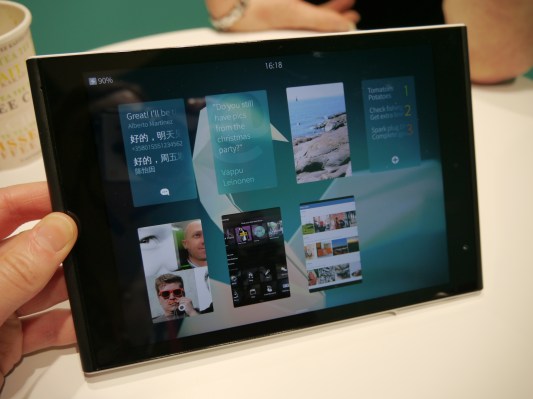Hardware is always hard. But if you’re playing at the margins of a mobile ecosystem dominated by Android and iOS, well, it’s best described as a bloodbath. To wit: Finland’s Jolla, which makes its own mobile OS Sailfish and — previously — its own mobile devices too, has confirmed that its crowdfunded tablet is being canned.
The Jolla Tablet project started as an Indiegogo crowdfunding campaign, back in November 2014, which went on to raise more than $2.5 million from some 21,600 backers. The overly optimistic estimated shipping schedule for the slate was the following year. Instead, Jolla was showing off unreleased hardware at the MWC trade show last spring — where TechCrunch got hands on. And backers were left waiting for the rest of 2015.
Writing in a blog update on the tablet late last week, Jolla co-founder and chairman Antti Saarnio confirmed that only a very small number of backers will now get a tablet (540 units will ship, starting from February). He said the rest of the backers will get a refund — although this process may take up to a year.
“Jolla aims to refund the total contribution, including shipping and all accessories. Due to the financial constraints this will happen in two parts: half of the refund will be done during Q1/2016, and the other half within a year, our financial situation permitting,” he writes.
Last November Jolla was forced to cut half its staff and restructure its debts after failing to secure new funding to continue operating the business. And although it subsequently closed a Series C the damage to supply chain relationships had evidently already been done.
So while, last November, Saarnio was still suggesting there would not be “a huge impact” on shipping the tablet if Jolla went on to secure its finances before the end of the year, by December he admitted it was considering its options — including canceling the tablet.
“This is a quite challenging situation because it’s not linear what is the harm done on the tablet program,” he told TechCrunch at the time. “It’s something that if you delay or stop working with your production partner for a couple of months it basically means that it’s difficult to [re]start the process as well.”
“Due to the delays in the latest financing round it has simply become too late to produce all the tablets for the project. The supplier no longer has the needed components and many of them are no longer available. Unfortunately, there is nothing that can be done now to change this,” writes Saarnio now.
So chalk up another tale of failed crowdfunding, and a salutary lesson that when it comes to hardware crowdfunding expecting delays (at the very least) is always wise.
At least Jolla is being thorough in its communications, with an updated FAQ on its blog answering backers’ questions.
One of these questions asks what the future of its Sailfish alternative mobile OS looks like. Jolla says it has been able to continue development after receiving its Series C funding in December, but it also notes finances remain tight at this point. So there’s little doubt that Jolla still has tough times ahead of it.
“We are currently receiving significant interest from different mobile industry players to license the operating system. One of the publicly announced projects is the community driven Fairphone project, but there are many other negotiations going on and Sailfish OS is gradually taking steps to become an OS used by multiple device vendors. However, Jolla is still very tight financially and is currently negotiating with its creditors for extended payment terms so that all the available financial resources could be efficiently used to secure the needed OS development.”
(You can read more about the Jolla-Fairphone community project here.)
Last summer Jolla was already seeming to pivot away from hardware, announcing it would split into two with its first order of business being software — and a vague plan to create a second business to build hardware. That business has yet to materialize — unsurprisingly so, given Jolla’s financial difficulties. The failure of the Jolla tablet is likely the last nail in the coffin for its own-brand devices.
